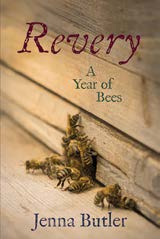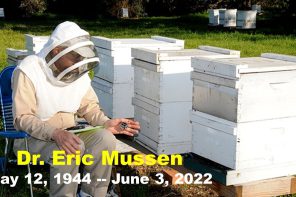By: Mark Winston
As a staunch reader and a lover of language, I maintain a book of quotations into which I copy out those stellar phrases and sentences that jump out from the pages with startling clarity. Here’s one that just about leaped into my quotation journal on its own, from Jenna Butler’s remarkable new book Revery: A Year of Bees, referring to the myriad afflictions managed and wild bees are facing these days:
“Just because bees can scrape by in these adverse conditions, that absolutely doesn’t mean that we can let ourselves off the hook . . . We need to start asking ourselves whether keeping bees going is good enough, or whether we truly need to think about bees thriving.”
Butler is a writer and ten-hive beekeeper living on an off-grid organic farm in central Alberta, where she also is a professor of creative writing and eco-criticism at Red Deer College. Her book is indeed a revery, the condition of being lost in thought.
It’s an unusual blend of reflection, practical insights into bee management and thoughts about changing climate, all woven tightly together with memoir of personal trauma and a life lived on and with the land. And, it was short-listed this October for the prestigious Governor General’s Literary Award for Nonfiction, indicating the quality of her writing and suggesting it’s a book of interest well beyond the beekeeping community.
Revery is in that rare but fine tradition of writing about bees from the heart, going back thousands of years. Writers such as Virgil, Butler, and Maeterlinck have enriched us with details about bee biology and management that anchor their love of bees with practical insights, coupled with awe and wonder at the marvelous adaptations manifested by social and solitary bees alike. Jenna Butler’s book is the latest in this lineage, placing bees in the larger context of the environment with which they interact and the lessons we humans can learn from these marvelous creatures.
The book’s format follows honey bees throughout a calendar year on her farm, beginning with January Winter and ending in December. Each chapter provides more than just clear writing about that season’s typical colony condition and management. She delves into deeper issues about how we manage honey bees today, how that is shifting and should continue to shift, and what honey bees as well as wild bees are telling us about climate change and other environmental conundrums.
Much of Revery is about healing, of the land we live on, the way we practice agriculture, the terrible tragedies of bee loss afflicting honey and wild bees alike, the lack of diversity in beekeeping, and Butler’s own journey from trauma. But what’s remarkable about her writing is that she is not strident or politically correct, but rather simply a person speaking from the heart with compassion and clarity about the challenges faced by bees, people and the land.
For bees, she is direct and clear about how interactions between monocropping, pesticides, poor nutrition and pests are decimating managed and wild bees. But she also writes with respect around the remarkable innovations that Alberta beekeepers have made over a couple of centuries keeping bees in a harsh climate, and speaks with sympathy about the economic challenges faced by commercial beekeepers today. Rather than divide, she writes with hope that we all can work together to create economically viable beekeeping in which bees as well as beekeepers can thrive.
She also writes about the changing nature of beekeepers in Alberta, with many younger beekeepers coming on the scene, including women and beekeepers of color becoming more prominent in both hobby and commercial operations. She is a great champion of diversity, agriculturally, environmentally, and socially, recognizing that diversity cushions us against change and provides a wealth of responses to draw from when challenged by new situations.
Butler explores the many ways beekeepers seek healing through bees, going well beyond the expected apitherapy treatments. She notes how some seek economic healing, hoping for financial independence and security, others find spiritual growth through bees, “creatures whose very existence . . . cause the humans tending them to monitor their own hearts carefully to avoid causing distress to the hives.” She simply but eloquently summarizes how her time with bees has helped her manage deep hurt and pain in her own life: “Beekeeping forces me to learn how to handle my own weather.”
Revery is a fine, fine book, and I encourage you to run, not walk, to your nearest independent bookstore and order it, post-quick. It really is that good.
Mark Winston’s most recent book, Listening to the Bees, co-authored with poet Renee Sarojini Saklikar, was awarded an IPPY 2019 Gold Medal Independent Publishers Book Award. This review first appeared in Bee Scene, the quarterly magazine of the British Columbia Honey Producers Association.
Author
Mark L. Winston, FRSC
Professor and Senior Fellow
Morris J. Wosek Centre for Dialogue
Simon Fraser University
3309-515 W Hastings St, Vancouver, B.C. V6B5K3 Canada
Mobile: 604-561-9080
Email: winston@sfu.ca
Personal blog and Website: www.winstonhive.com
Centre for Dialogue: www.sfu.ca/dialogue







